Enlisted vs. Officers in the U.S. Military (What’s The Difference?)

The United States Military has over 2 million personnel serving in its ranks. Among these ranks are six branches, hundreds of jobs, and countless opportunities. But no matter which branch you serve in, what job you have, or where you’re located, there are just two distinct groups of service members that make up the ranks: Enlisted and Officer.
To the untrained eye, those might just seem like two different words. What’s the big deal, right? For those in the know, those two simple words mean a hell of a difference. The choice to join as enlisted or officer will ultimately shape the fate of a service member's career, such as determining their quality of life, responsibilities, opportunities, pay, and a whole lot more.
With that said, what exactly is the difference between enlisted and officers? Is one better than the other? What do each of them do? And most importantly, what does one’s career look like? We’re going to answer all of those questions for you, and much more.
TABLE OF CONTENTS
ENLISTED vs. OFFICER: BASICS and OVERVIEW
ENLISTED vs. OFFICER: OPPORTUNITIES
ENLISTED vs. OFFICER: CAREER PROGRESSION
ENLISTED vs. OFFICER: TRAINING AND REQUIREMENTS
ENLISTED vs. OFFICER: CONCLUSION
ENLISTED vs. OFFICER: BASICS and OVERVIEW
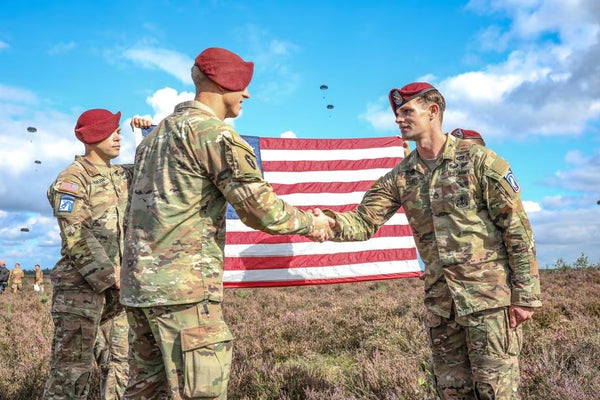
Let’s kick things off with the basics. In a nutshell, enlisted personnel are the backbone of the U.S. military, and make up approximately 80% of its ranks. Officers, on the other hand, can be viewed as the managers or leaders, and make up 20% of the U.S. Military. Another way of putting it is the Officers are like the CEOs and department heads of a corporation making decisions, and the enlisted are the supervisors and workers who carry out those decisions.
This isn’t to say that enlisted personnel don’t lead - quite the contrary. Remember, they are the backbone of the military. Both enlisted personnel and officers have their own unique ranks of hierarchy, which are used to indicate their level of seniority, leadership, and responsibility. These ranks are associated with a pay grade. These pay grades all have a letter followed by a number. The letters are E for enlisted, W for Warrant Officer, and O for commissioned officers. The numbers go from E1-E9, W1-W5, and O-1 to O-10, respectively.
Obviously, the higher the number, the higher the rank. But here’s where things get a bit complicated. Officers outrank ALL enlisted, no matter how long they have served. For example, an E-9 who has served for over 30 years will be outranked by a 22-year-old O-1 who is fresh out of officer training. That might seem surprising, but it’s just the way the military works. But don’t get it twisted, it’s not like that butter bar will be barking orders to that E-9, because that E-9 answers to someone much higher than them. More on that later.
As part of the U.S. military’s customs and courtesies, all personnel, whether they’re enlisted or officers, salute superior officers and address them as Sir or Ma’am. So if an E-1 walks by an O-1, they will salute that officer and the officer will return the salute. If that O-1 then walks by an O-3, that O-1 will salute the O-3 first, etc. Enlisted personnel do not get saluted unless they’re a medal of honor recipient.
Generally speaking, enlisted and officers are pretty segregated in the military. While they work together, their uniforms can be different, they typically go to different training programs, they’re housed differently, and are not allowed to be buddy-buddy or get into relationships with each other… that’s called fraternization. There are obviously exceptions to this, like if you knew them before you joined, etc., but this isn’t a blog post on preventing fraternization in the military. You’ll have plenty of boring mandatory training classes on that one!
Make no mistake, even though officers outrank and are in charge of the enlisted, they still respect, appreciate, and learn from them. As we said earlier, Enlisted personnel are often considered the backbone of the U.S. Military, and they do a lot of the dirty work. Senior enlisted often advise junior and senior officers because they bring value to the table with their experience and years of service.
Alright, enough of the basics. There’s still a lot to unpack here.
ENLISTED vs. OFFICER: OPPORTUNITIES
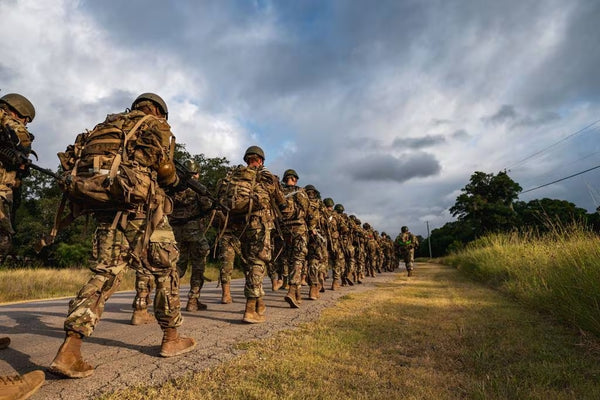
The decision to go Enlisted or Officer will affect your career path and the opportunities you’ll have during your service. While you can always enlist first and become an officer later (this is called a mustang), that choice will still inevitably change your path.
As we briefly mentioned before, officers are like managers and enlisted are like workers. In other words, enlisted personnel have specialties and perform specific job functions, whereas officers manage those enlisted personnel and plan missions, provide orders, and assign tasks.
Additionally, enlisted personnel will have plenty of opportunities to fine-tune their skills and become subject matter experts in their specialties, while also fitting into leadership roles and responsibilities. Officers will also receive plenty of leadership training and experience to better prepare them to lead larger bodies of personnel.
We’ll touch on this in more detail later in the blog post, but generally speaking, with limited exceptions all officers are required to have a Bachelor’s degree or higher to receive a commission. Enlisted personnel on the other hand are not, though plenty may still have bachelor’s and/or master’s degrees. Because of the degree requirement for officers, there are plenty of jobs that enlisted personnel are simply barred from doing, even if they have a degree.
For example, pilots in the U.S. Military, with the exception of Warrant Officers for the Army, must all be commissioned officers. You can be an E-5 with a private pilot’s license and a Ph.D. in aeronautics all you want, but you’re not gonna be flying any U.S. military aircraft unless you become an officer. Plus, if you have a Ph.D., why are you an E-5 in the military? But anyway,
There are also opportunities for white-collar jobs for officers, such as physicians, nurses, and lawyers, which is pretty cool.
When you flip the coin to enlisted, while you might not be able to be a pilot, the sky’s the limit with opportunities here, no pun intended. Not only do you have the option to commission if there’s an officer job you really want, but if you can think of a career field, chances are there’s something for you. The six branches of the U.S. military afford many different opportunities and areas of work for all types of people. From cooks to intelligence, and special operations, all the way to language specialists, we could go on and on. Bottom line: the opportunities for enlisted and officers can widely vary depending on the community you choose.
ENLISTED vs. OFFICER: CAREER PROGRESSION
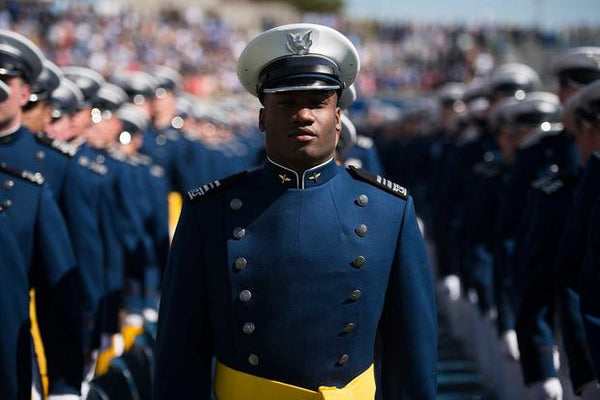
While career progression can arguably be folded into opportunities, we believe this is an important topic to discuss on its own merit. The career progressions of enlisted vs. officers have some similarities but differ in their execution. Let us explain.
Assuming you rank up, the longer you’re in the U.S. Military, the more responsibilities you get. Whether that’s an E-6 running a platoon, or an O-5 captaining a warship, you gradually take on more oversight and administrative work. For enlisted personnel, your first true leadership and oversight experience begins when you become an NCO, which stands for Non-commissioned Officer. Depending on the branch, this will either be at E-4 or E-5. While you still have your day-to-day hands-on duties, you will begin to take responsibility for those under you as well. As you progress up the ranks, you become a Senior Non-Commissioned Officer, where you’ll be given less hands-on work and more administrative stuff.
Officers generally start right off the bat with supervisory positions, albeit at a smaller scale compared to the higher officer ranks. As they progress through the ranks, they assume more and more oversight, up to the point where they can be in charge of entire continental regions.
This isn’t to say that enlisted personnel can’t reach similar heights. While officers may have the opportunity to be in charge of an entire military branch, senior enlisted personnel are right by officers’ sides at every command level. For example, you can see this with the highest-ranking officer of the U.S. military: The Chairman of the Joint Chiefs of Staff. Alongside him is the highest-ranking enlisted member of the U.S. Military, the Senior Enlisted Advisor to the Chairman of the Joint Chiefs of Staff. No matter how high you go, there will always be someone enlisted representing the enlisted service members.
With all of that said the main takeaway that you should get from this section is that although both enlisted and officer personnel tend to get less hands-on as time goes on, it generally happens a lot sooner for officers. To highlight this point, we’ll talk about the Navy SEALs. If you enlist as a SEAL, you can stay operational for multiple tours, even as you progress through the ranks. But for officers, once they do a tour or two and hit O-3, maybe O-4, they’re done being operational and will take on more administrative work. Whether it’s the SEALs, Infantry, or Intelligence, you need to understand the roles that enlisted and officers play to see what your career progression will look like.
ENLISTED vs. OFFICER: PAY
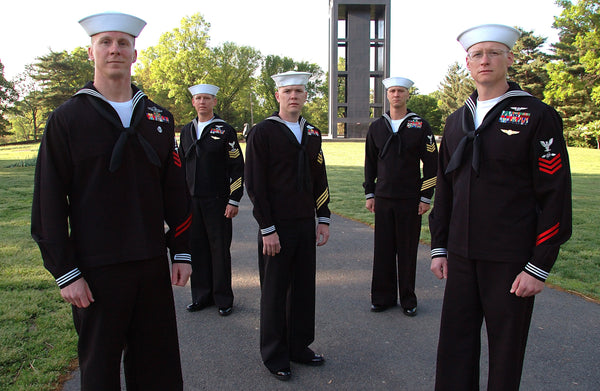
This section is pretty straightforward. Officers make more than enlisted personnel. To compare, an active duty E-3 fresh out of boot camp in 2023 makes $2,259.99 of base pay a month, whereas a fresh active duty O-1 makes $3,637.26 of base pay a month. Not only that, but officers are entitled to BAH, or Basic Allowance for Housing, right off the bat. In a nutshell, BAH is a monthly stipend scaled to the cost of living in your zip code so you can live out in town. Enlisted personnel must wait to get BAH once they rank up anywhere from E-4 to E-6 depending on the branch, or if they get married.
Military pay is much more complex than just Base Pay and BAH, but that can be a blog post on its own. To show you how much pay can contrast later in your career, let’s take an active duty E-7 with 20 years and an active duty O-5 with 20 years both stationed at Nowhere, Kentucky. Both also have dependents.
According to the 2023 Pay Scales, the E-7 gets $5473.30 of monthly base pay with $1668.00 in BAH, and the O-5 gets $10,544.62 of monthly base pay and $2,145 in BAH. That’s a monthly difference of $5,548, or $66,580 annually! ($1668.00 BAH with dependents for E-7, $2145.00 O-5 with dependents, 10544.62 O-5, 5473.30 E-7).
Remember, if you plan on doing your 20 years and retiring, your pension is partially dependent on how much money you made in your last three years of service, so this is all food for thought.
ENLISTED vs. OFFICER: TRAINING AND REQUIREMENTS

With the exception of some special operations communities, enlisted and officers receive their training separately in different schools. Everyone’s military career starts in some sort of boot camp or basic training. For the enlisted personnel, it's called exactly that - boot camp or basic training. Officers on the other hand have a bit more fancier names for their training. Generally, they can go to Officer Candidate School, ROTC, or one of the five service academies.
Once enlisted service members finish their boot camp, they move on to receive training in the specific job they signed up for with others who also joined with the same contract. The job training length is highly dependent on what job they selected. Some schools can be a couple of months, whereas some can be several years.
The same goes for officers, albeit they are also taught how to lead in the specific capacity they will be serving in. The length of their training pipelines is also dependent on the career field they choose, as a pilot’s training will be completely different from an infantry officer’s training.
As far as the requirements go, we touched on it briefly earlier, but to reiterate, enlisted personnel do not require any sort of college degree, they just need a high school diploma or G.E.D. with some college credits, whereas officers must have a bachelor’s degree to commission. There are exceptions to this rule, and there are also warrant officers, but again we’re not going to touch on them in this blog post. Additionally, the job you choose will depend on other requirements like security clearances, physical standards, and medical standards.
At the end of the day, just understand that joining as an officer will be more competitive in any aspect of the military compared to enlisting. This is due to the fact that there are fewer billets for officers than there are for enlisted, and more is expected out of officers.
If the stars align and you’re not precluded, you can always commission after you enlist… and some even decommission and serve as enlisted, but that’s generally not recommended or an ideal position to be in.
ENLISTED vs. OFFICER: CONCLUSION
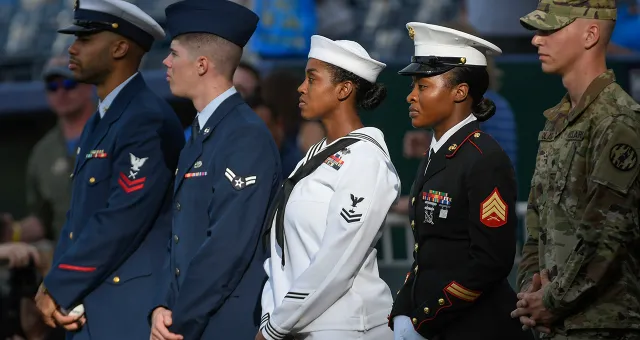
The goal of this blog post was to introduce the basic concepts of the differences between enlisted and officers in the U.S. Military. We hope this blog post achieved that goal, and that some of you got something out of this. If you’re reading this and are interested in joining the military, we highly recommend you weigh your options and determine what you want your life to look like throughout your prospective military career.
Another way that differentiates members of the U.S. military, as well as their day-to-day life and their time served, is whether they are active duty or reservists. If you’d like to know the differences between Active Duty and Reserves, you’re in luck! We’ve done a blog post on that.
If you’re wanting to learn more about the military, law enforcement, or government entities, we have a YouTube channel dedicated to providing the best info out there, plus we have a growing list of blog posts as well. Click the links to take you to them!
General Discharge is a veteran owned, veteran operated organization that is dedicated to providing the best U.S. Military and Law Enforcement information. With over 250 YouTube videos, over 45 million views, and hundreds of thousands of followers, we have contributed to the success and knowledge of both the current and future generation of service members.






What a great article and a great author. Keep up the good content and presentation.
Great article, thank you. Would love to see more about Warrant Officers.
Great Content
Leave a comment